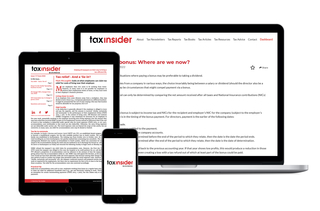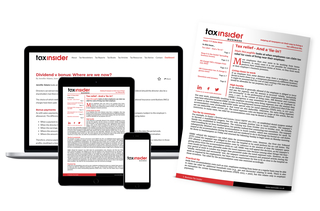New articles published
in February 2026
-
Dividend Tax Rates: The Impact on Profit Extraction
Once upon a time, it was very beneficial to operate a business through a personal or family company and, once the personal allowance had been used up, to extract further profits as dividends.
Sarah Bradford explains the impact of the changes in the dividend tax rate on the extraction of profits from a personal or family company.
-
Directors’ Loan Accounts: Tax Implications and Timing Issues
Many owner-managed businesses will have a director’s loan account (DLA) on their balance sheet. For advisers who work with entrepreneurial clients, it is important to understand how these balances arise, how they can be cleared and how the various tax charges operate when they are not.
Sam Hart looks at the tax implications and timing issues with directors loan accounts.
-
Business Property Relief: A Common Inheritance Tax Pitfall
Business property relief (BPR) offers inheritance tax (IHT) relief (at 100% or 50%) on transfers of value attributable to ‘relevant business property’ where certain conditions are satisfied.
For example, shares in an unquoted trading company potentially qualify an individual shareholder for BPR (at 100% up to an upper threshold of £2.5m from 6 April 2026, and at 50% thereafter), subject to general restrictions where the company’s activities consist wholly or mainly of dealing in stocks or shares, land or buildings, or making or holding investments. This article focuses on single (i.e., non-group) companies.
Mark McLaughlin looks at an inheritance tax business property relief pitfall for company owners.
-
No VAT Invoice: When Can Input Tax Still Be Recovered? Part 2
In R (Hotelbeds UK Ltd) v HMRC [2025] EWHC 2312, the Administrative Court directed HMRC to allow input tax deduction notwithstanding the business holding no VAT invoices at all. Whilst welcome for businesses in general, it is important to appreciate the limits of the judgment and where it stands in the wider legal order.
The previous part addressed the EU law principles which still influence the status of the VAT invoice in the UK. This part will move on to the question of how these are given effect in domestic law, and which other relief UK law provides.In the second of this two-part series, Fabian Barth lays out the circumstances under which domestic UK law allows taxpayers to deduct input tax even in the absence of a valid VAT invoice.
-
Q&As with Arthur Weller
Some of our most popular articles
-
Extracting profits from your personal or family company
A company is a separate legal entity, distinct from the shareholders that own it. Consequently, if the directors and shareholders want to use the profits made by the company for their personal use, they will need to extract those profits first. There are various ways in which this can be done; some are more tax-efficient than others.
Sarah Bradford considers options for extracting profits from a company in a tax-efficient manner in the 2024/25 tax year.
-
Is HMRC playing ‘dividend detective’?
HMRC recently undertook a ‘One to Many’ letter campaign, wherein HMRC’s skilled data analysts undertake to mine nuggets from a huge range of sources to test for omissions or errors in tax returns.
Lee Sharpe reports on HMRC getting all ‘Nancy Drew’ with its sleuthing over company reporting and shareholders’ dividend income returns.
-
A little known but generous CGT relief
Some company shareholders may either be unaware or have forgotten about a relatively unknown capital gains tax (CGT) relief that offers a reduced CGT rate of only 10% on qualifying gains of up to £10m during their lifetime, if certain conditions are satisfied.
Mark McLaughlin highlights a relatively unknown and infrequently used but generous capital gains tax relief.
-
Extraction point: Extracting profits on cessation
Owner-managers can spend a significant amount of time and energy building a successful and profitable trading company.
Joe Brough looks at tax issues for business taxpayers and their tax advisers when a company is coming to an end.
-
Q&As with Arthur Weller
Subscription Benefits
We asked our subscribers what they love about Business Tax Insider.
These are the top 7 reasons that they gave us:
Monthly Newsletter
Business Tax Insider…





